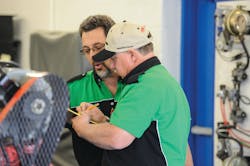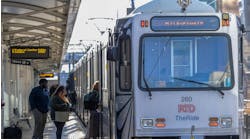When Michael Hennessy took part in the first committee to form the American Public Transportation Association’s International Bus Roadeo in 1987, the event created looked a lot different than it is today.
In fact, it wasn’t even a contest until it was officially sanctioned in 1988. Technology was a lot different back then so roadeo challenges were a lot different than what today’s event has.
But Hennessy — who then worked for the Chicago Transit Authority but is now regional sales director for Proterra Inc. — said the creation of the bus roadeo was done out of the need to enhance technician skills.
“From my perspective both from the bus operator side and now from the vendor side that supplies the bus operators it has been about helping educate technicians,” he said. “Bus technology improvements have changed a lot over the last 20-plus years, so in order to keep technicians up-to-speed on technology and educated and well trained.
“It always was and continues to be based on need.”
Now more than 26 years since the first APTA bus roadeo took place, the event has become a hit with technicians looking to compete against other agencies from across the nation after winning their way through local regional and state competitions. While the competition may be the most exciting part of the roadeo for technicians, the drive to use the competition as a training session continues.
More than a competition
Although not all states and agencies partake in roadeos, Hennessy said there’s active outreach to them to participate and support local level roadeos, their value and what the technicians bring back to the agencies in terms of skills.
Michael Collins, project manager with the Metropolitan Transit Authority in Harris County, Texas, said the agency has been taking part in the roadeos for about eight or nine years and the preparations they take to get ready strengthens them and the team.
As far as camaraderie goes, Collins said the top individuals from the local event will get to participate in the International Rodeo and compete as a team. And in 2015, the agency will have a new rail shop and we expect there will be an added level of competition between the two shops.
“I think the guys are pretty competitive,” he said. “It’s just a fun event for everybody to come together.”
A big benefit to maintenance roadeos Collins said is that it involves a lot of self-training on the part of the technicians because they don’t know what the competitions will be so they have to study up on everything.
“It encourages them to really dig into the manuals and figure out things on their own,” he said.
The event even brings non-technicians into the fold, Collins said, with people outside of the MTA maintenance department even getting involved showing they have a willingness to learn as well.
After the local competition is completed, the technicians will usually talk about the events and share their knowledge with each other, as they try to figure out what they did right or wrong during the competition. Hennessy said the same happens after the international, which allows competitors to network with peers from across the country, which can give them a broader view of issues facing maintenance departments.
In Florida, a statewide roadeo for operators and maintenance technicians mirrors the challenges faced in the American Public Transportation Association competition and agencies of all sizes take part in the challenge. Edward Bart, program manager for the Center for Urban Transportation Research at the University of South Florida, said in preparation for the event all agencies are afforded the opportunity to train and get assistance to prepare for the competition.
While the roadeos are important, Florida has a training method for maintenance technicians, which was certified by the state’s department of education.
Bart said Florida also offers a transit technician program that was developed through a consortium of meetings with maintenance officials that was certified by the Florida Department of Transportation and is offered at all community colleges throughout the state.
“It’s very comprehensive and very specific to the maintenance issues of the state,” he said. It’s way more than what we get at the roadeos.”
Bobby Westbrook, transit operations administrator for the Florida Department of Transportation (FDOT), said vendors like Cummins and Gillig have always been willing partners in helping train technicians. The Florida competition is getting additional help with the addition of the Vapor door component coming into play.
“The vendors we utilize heavily in the roadeo,” he said.
Although the modules tend to stay the same with defects changed annually, Westbrook said roadeos are something the maintenance departments never tire from.
“I know here in Florida, these guys get pretty hyped up about it,” he said. “It’s more of a pride thing that they get 12 months of rights and it’s a pretty big competition.”
Taking it to the next level
Hennessy said the bus roadeo committee continues to find ways to improve core competencies for technicians given the better propulsion systems being set in buses along with improved technology in the doors, brakes and other components. Suppliers have stepped up to improve the training, with some like Thermo King working to improve HVAC skills and knowledge so the techs can better diagnose and repair malfunctioning units in a timely fashion.
The written exam was recently returned to the international competition, Hennessy said, with ASE partnering with the organization to give a thorough examination of core competencies by contestants.
“It’s a very high quality committee that consists of suppliers and properties that really is the industry’s best of the best,” Hennessy said.
Bart said one thing they’ve done in recent years in Florida is change up the wording on the written test to resemble an ASE certification exams, which help prepare the technicians for those tests as part of getting their ASE certifications.
With the changes to the written test, the Florida roadeo also has its own tweaks each year in order to make it the most relevant to technicians in that state and to enhance skills in issues that are specific to agencies within its climate.
“We tend to have some unique programs, so it’s kind of cool,” Westbrook said. “The training we put together is not necessarily off-the-shelf kind of stuff and it’s fluid. It constantly changes.”
While training is beneficial and allows for maintenance departments to build camaraderie and enhance their skills, it’s still difficult figuring out the logistics of such an event on a state level. Westbrook said finding a location to have such an event can be difficult and the agency hosting the roadeo has to undertake a lot of preparations.
“I’m sure other states suffer from this too, but only your larger urban agencies are capable of an event that size,” Westbrook said. “So, we’re limited to a select few large urban agencies who can host it.”
Hennessy said the committee overseeing the international is also out at the roadeo and monitoring the competition to see how well it’s going and how the mechanics are embracing it different parts of the event. He said organizers also informally talk with suppliers when planning the events to get their thoughts on how to improve the competition and get their ideas.
“Each year we tweak and modify it and talk about what’s really good and what’s great and what things we can do to make it even better next year,” Hennessy said.
As more transit agencies begin moving more towards compressed natural gas fuel, Florida organizers are looking to get more specific to that fuel type in the competition for technicians to handle. Training had focused on the hybrid electrics for the past several years, however, BART said trainers are always looking to the horizon to see what’s going on from the technology and procurement level and CNG seems to be the future in Florida. Once about 25-30 percent of fleets are CNG, then it could make its way into the roadeo.
“We don’t train in a vacuum,” Bart said. “That same transit consortium looks at the curriculum and they recommend improvements.”

Joe Petrie | Associate Editor
I came to Mass Transit in 2013 after spending seven years on the daily newsbeat in southeastern Wisconsin.
Based in Milwaukee, I worked as a daily newspaper reporter with the Waukesha Freeman from 2006-2011, where I covered education, county and state government. I went on to cover courts for Patch.com, where I was the main courts reporter in the Metro Milwaukee cluster of websites.
I’ve won multiple awards during the course of my career and have covered some of the biggest political events in the past decade and have appeared on national programs.
Having covered local government and social issues, I discovered the importance of transit and the impact it can have on communities when implemented, supported and funded.







